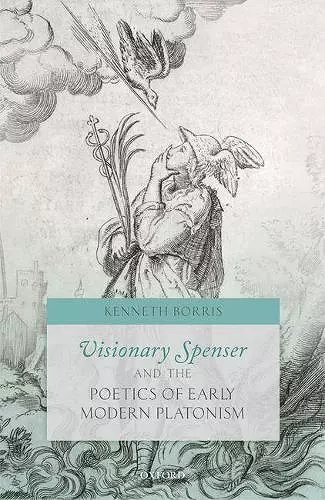Visionary Spenser and the Poetics of Early Modern Platonism
Format:Hardback
Publisher:Oxford University Press
Published:10th Aug '17
Currently unavailable, and unfortunately no date known when it will be back

Platonic concerns and conceptions profoundly affected early modern English and continental poetics, yet the effects have had little attention. This book defines Platonism's roles in early modern theories of literature, then reappraise the Platonizing major poet Edmund Spenser. It makes important new contributions to the knowledge of early modern European poetics and advances our understanding of Spenser's role and significance in English literary history. Literary Platonism energized pursuits of the sublime, and knowledge of this approach to poetry yields cogent new understandings of Spenser's poetics, his principal texts, his poetic vocation, and his cultural influence. By combining Christian resources with doctrines of Platonic poetics such as the poet's and lover's inspirational furies, the revelatory significance of beauty, and the importance of imitating exalted ideals rather than the world, he sought to attain a visionary sublimity that would ensure his enduring national significance, and he thereby became a seminal figure in the English literary "line of vision" including Milton and Blake among others. Although readings of Spenser's Shepheardes Calender typically bypass Plato's Phaedrus, this text deeply informs the Calender's treatments of beauty, inspiration, poetry's psychagogic power, and its national responsibilities. In The Faerie Queene, both heroism and visionary poetics arise from the stimuli of love and beauty conceived Platonically, and idealized mimesis produces its faeryland. Faery's queen, projected from Elizabeth I as in Platonic idealization of the beloved, not only pertains to temporal governance but also points toward the transcendental Ideas and divinity. Whereas Plato's Republic valorizes philosophy for bringing enlightenment to counter society's illusions, Spenser champions the learned and enraptured poetic imagination, and proceeds as such a philosopher-poet.
This is an indispensable text for the understanding of literary Platonism and Spenser's place in that tradition. * Richard Wood, The English Association *
[The book] will make anybody who reads it a more intelligent reader of Spenser's poetry as well. And so I hope that everybody does. * William Junker, Spenser Review *
This book will remain of interest to scholars seeking greater understanding of the depth of Spenser's engagement with Platonism and, crucially, how Plato continued to shape the poet's artistry throughout his literary career. * Matthew Woodcock, University of East Anglia, Modern Language Review *
will be of general interest to scholars of early modern literature and culture because of its wide-ranging claims for Plato's influence in the period ... Undoubtedly Borris's book will have a significant impact on readers of Spenser for some time to come, and the implications of his way of reading Plato back into the early modern period are likely to be influential as well. * Paul J. Hecht, Modern Philology *
All in all, Visionary Spenser is a learned book on a fascinating topic...Summing Up: Recommended. Graduate students, researchers, faculty. * B. E. Brandt, CHOICE *
ISBN: 9780198807070
Dimensions: 241mm x 168mm x 22mm
Weight: 558g
268 pages